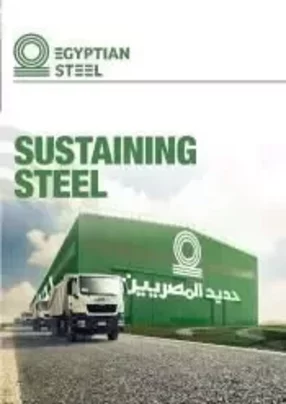Stepping into the steel industry in 2010, propelled by over $2 billion of investment, Egyptian Steel is growing to become a leading diversified manufacturer and stalwart of the recovering Egyptian economy. Backing up substantial capex with robust social, environmental and operational programmes, the company is looking forward to years of sustained growth and success. Since we spoke to CEO Ahmed Abou Hashima in the July 2015 issue, the company has undergone a number of structural changes and is now in the process of diversifying its offering to the domestic and international market.
Abou Hashima is proud of how far his company has come – and is optimistic about its place in developing the country, he says: “Steel is crucial for the economy. We have a shortage of 8 million housing units and infrastructure. The whole population lives on only 7 percent of the land. In order to develop Egypt, steel is vital for at least several decades. It’s a strategic industry that employs thousands of people.”
Operational development
Operations are shared across a number of subsidiaries which consist of Egyptian Steel for Building Materials, National Port Said Steel (NPSS), and IIC for Steel Plants Management. Together, these divisions enable the company to provide a range of steel production capabilities to the market – supported by a number of technological innovations.
“When all four plants of Egyptian Steel are at full capacity we will be able to acquire a 20-25 percent market share in Egypt,” says Abou Hashima, “We’re also expanding into the cement industry with a production capacity of 2 million tons per year, and going into IPO is in our plan, although there’s no set time for it yet.
“We have already taken our first step into the cement industry by establishing the sister company Egyptian Cement, and in the future, after mainly operating in steel and cement we might look into diversifying into other building materials such as wood, ceramic, and glass. Our vision is to make the group a one-stop shop for all building materials.”
By the end of 2017, all of Egyptian Steel’s plants will become operational and the company will have an estimated workforce of 6,000 people. “With the opening of the Beni Suief plant we’re also opening a vocational development centre for training steel plant workers in order to improve their skills and performance,” Abou Hashima adds.
But the centre is not limited to just people working for Egyptian Steel, “It’s open for free to anyone who wants to learn,” he says, “It helps us raise the caliber of our workers and at the same time is part of our role to give back to society, and enable people to have an opportunity to improve their skills to be able to compete in today’s workforce market.”
While Egyptian Steel is backed up by significant investment, the company has had to face up to the industry-wide challenge of sourcing enough energy for production. “The government has made an enormous effort to improve the power grid,” Abou Hashima says, “There have been new power stations launched, as well as mega projects with companies like Siemens to generate power, as well as the outstanding natural gas field discovered by Eni, which will have a great impact in the future.”
“The situation is definitely better, but we have started using new energy saving technology which will enable us to avoid any problems in both the long and short run.”
Sustainable steel
Embedded within Egyptian Steel’s business model is the imperative to operate as responsibly as possible, a philosophy that it applies holistically, to its workers, the environment and the Egyptian people.
At a technical level, the company has made massive strides in energy saving through use of more efficient technology. Combined, the eco-friendly technology that company is using saves almost 60 percent of the energy required and saves as much as 30 percent of emissions – innovations that have added an extra competitive edge. Egyptian Steel also recycles 100 percent of its steel scrap
This technology is the first of its kind in the Middle East and Africa, and only the third instance in the world. The other two steel plants that use this technology - one in Arizona and the other in Greece - produce 250,000 tons/year, while Egyptian Steel’s Beni Sueif and Al Ain Al Sokhna plants each have a production capacity of 830,000 tons/year, making Egyptian Steel the biggest manufacturer of green steel globally.
Abou Hashima adds: “I created a concept that I like to call ‘socially responsible capitalism’ which emphasizes that the civil society has rights that should be fulfilled - it’s our duty to improve people’s lives and to lessen their suffering as much as we can.”
And the company is continuing to achieve this social mission. In 2014 Egyptian Steel scrapped its advertising agenda in order to refit 40 of the poorest villages in the country with basic amenities. Since then it has also sponsored a large number of Egyptian athletes, and the Paralympic team. What is clear from its conscious social work is a desire to share the success of the company in order to raise the standing of as many people in the county as possible.
Abou Hashima adds: “It’s very flattering that our CSR efforts got recognition on a local and on an international level. But what actually keeps me motivated is the happiness I saw on the villagers faces when they moved into their revamped homes.”
The company is also currently working to obtain ISO 9001 (Quality Management Systems), IS0 14001 (Environmental Management Systems) and OHSAS 18001 (Occupational Health Safety Assessment Standard).
Having built on an already strong foundation of investment and national demand for its products and services, Egyptian Steel is set to play a major role in developing the country’s economy and skills base for many years to come.


